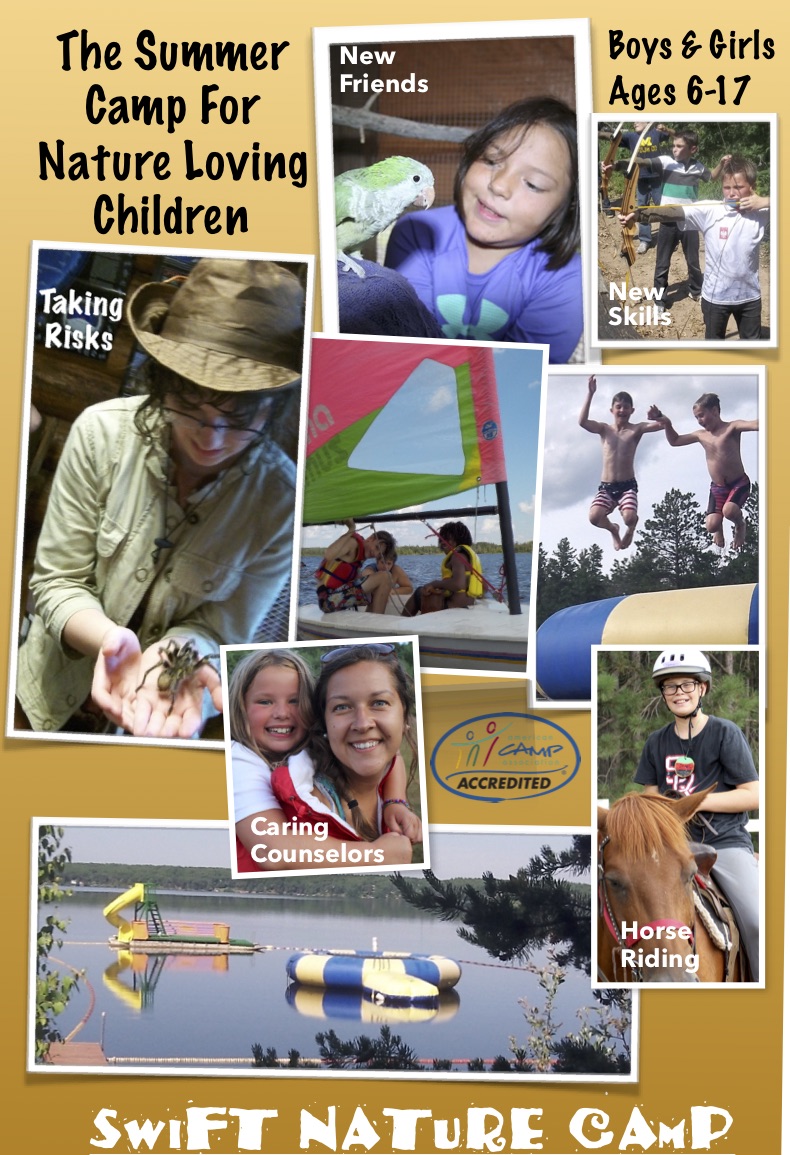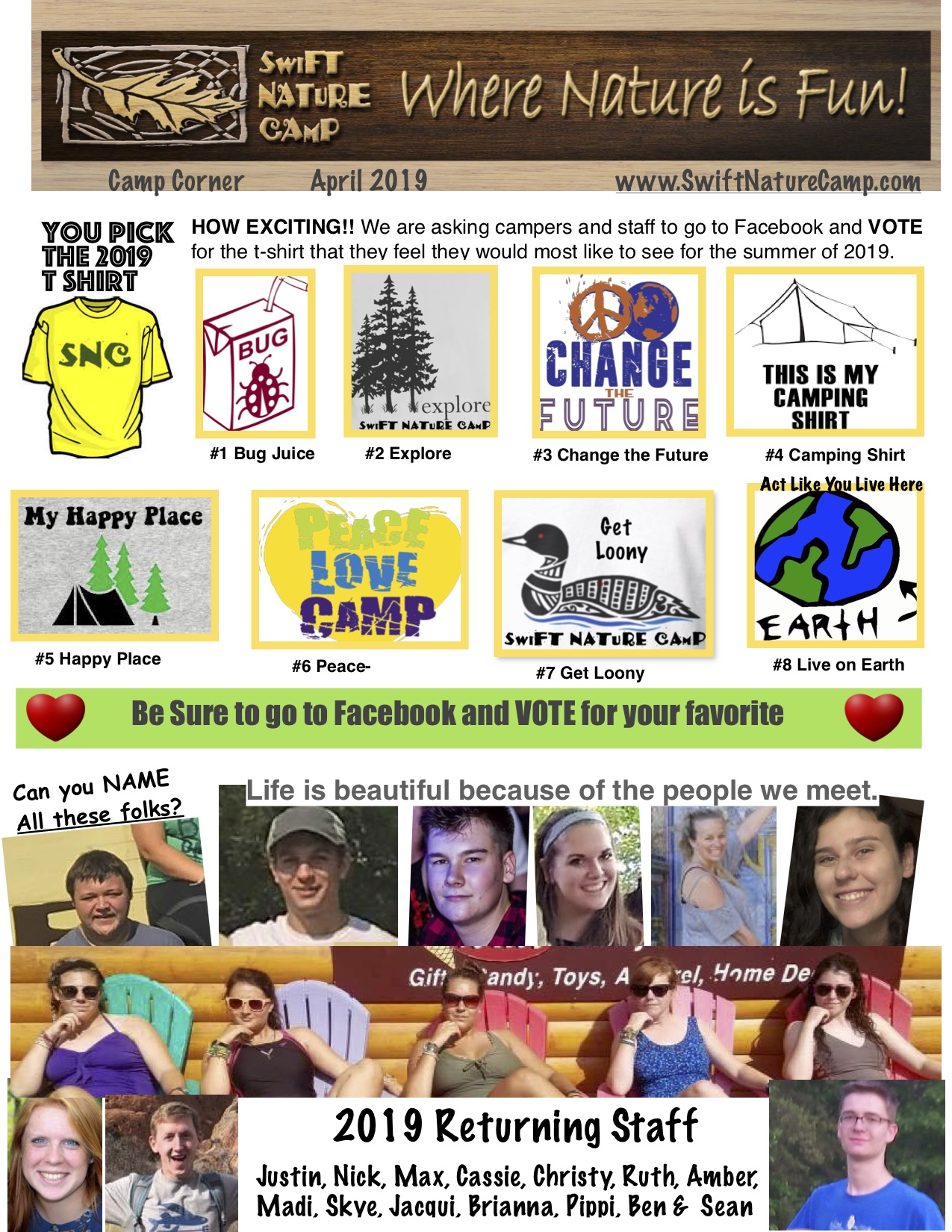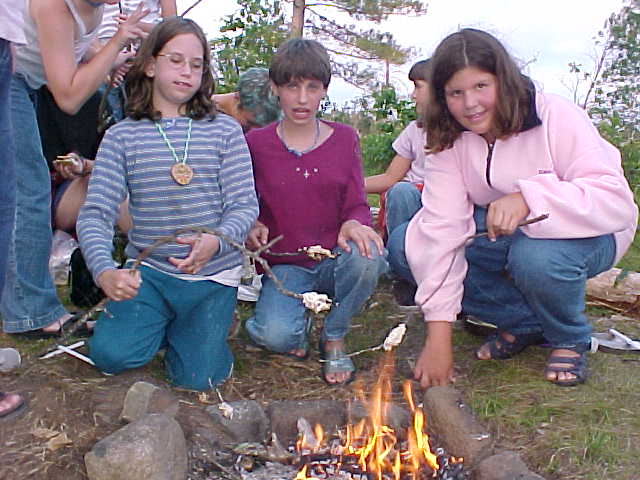 Summer camp is a special place it give children a place to call home that is less structured has less pressure than their home routines of school and sports. Plus it gives kids a chance to experience life in a screen free zone, just like the olden days. Yet when an overnight summer camp has an environmental Education focus, camp doubles up its value to campers and parents alike.
Summer camp is a special place it give children a place to call home that is less structured has less pressure than their home routines of school and sports. Plus it gives kids a chance to experience life in a screen free zone, just like the olden days. Yet when an overnight summer camp has an environmental Education focus, camp doubles up its value to campers and parents alike.
At Swift Nature Camp is an environmental education summer camp in Wisconsin that is rooted in fun with nearly 50 different land and water activities its hard not to have fun. Learning new skills in a non competitive fun way allows each child to participate at their level and try to better themselves. To give children autonomy, camp daily gives children the opportunity to select the activities that they want to do that day. So in a way a camper get to create their own camp experience rather than having adults give them a schedule. Kind of like the old days when chidden could just go outside and play.
Our campers love nature and environmental studies, so at Swift Nature Camp we blend camp activities with outdoor education along with summer fun. Our goal is to have our campers uses an exploration to developing an hands on appreciation and understanding of the natural world in Wisconsin that is right outside their cabin door. .Our interactive activities utilize scientific skills of discovery, observation and investigation. Yet what are campers love is our Nature Center and Camp zoo. Here many native animals are kept as well as other small pets. Campers even have the opportunity to adopt an animal while they are at camp. These critters are for learning responsibilities and animal care.
Our daily environmental classes seeks to teach campers about human impact on the environment and to be aware of how they are connected to nature. This individual responsibility is the key to teaching children about conservation. our hydroponic garden project is special because the campers help catch the fish that help verbalize the plants living in the garden, this interaction helps make the concepts stick. SNC
Not only do campers learn Environmental Education but this overnight summer camp in Wisconsin let's children learn skills in personal relationship building. Kindness and understanding are the corner stone to cabin life, helping to insure team-building and cooperation. To learn more about Environmental Education in Wisconsin
Minnesota is blessed with many natural resouces and a rich natural back drop. Yet, Minnesota is becoming increasingly urban, not just Minneapolis or St Paul, so too is the percentage of Minnesotans living in Greater Minnesota’s cities and towns. In 2010 census, 73.3 percent of Minnesotans lived in urban areas.Yes, Minnesota life has changed! No longer are children exposed to nature as they used to be. Try this at home, ask a child 8-10 years old to describe an elephant or a bunny many will reach for a screen of some sort and want to show you. Yes, a picture is worth a 1000 words and yet something is lacking when we just reach for a screen.

I have asked many teachers over the years: "How is a Minnesota child's Environmental Science knowledge?" and most would say that the average child in Minnesota has less outdoor knowledge than thier grandparents. Some go as far as to say that some children have never touched a pine cone or picked up a worm on a rainy day. We have lost contact with the Environment. These same tachers say that they would love to teach more Environmental Education and take our kids outside, but they are so scheduled with what to teach that it gives them little opportunity.
Environmental Education Summer Camps are just one easy way a parent can empower their child's learning and reduce today's nature deficit. The urbanizatin of Minnesota reduces children's exposure to the the natural environment. It is more important than ever that our children get outside and reconect. Environmental education has numerous benefits, like helping children become good stewards and to think globally, as well as observe and act locally. Environmental education does more than just teaching about plants, animals and the world we live in. It is a valuable tool that encourages kids to think critically, observe nature and even sit quietly without a screen, all things we can use in our everyday world.
At Swift Nature Camp we take Environmental Education seriously, but not too seriously. Each day children will have the opportunity to be a part of our Nature Ceter activities. Many of the science activities are part of Nature Quest, the award-winning environmental program designed by the World Wildlife Federation,thus creating an amazing Environmental Camp. Our Nature Center and zoo at camp provide a dynamic setting for learning, as campers find themselves doing science experiments, conducting environmental testing, learning about the local wildlife, or participating in our camp recycling program. At Swift Nature Camp we even have a pond aquarium that campers can fill with their freshly caught turtles, frogs and fish. Our Nature's Neighbors live animal collection provides opportunities for up-close study and care of several common Northwoods residents, as well as a few exotic immigrants. Campers with their own small animals are encouraged to bring them to camp to share with others. The animals live in the Nature Center and camp Zoo, where all campers can enjoy and learn about them. As part of our environmental education campers can even adopt the pets while they are at camp, this gives a child responsibility while learning about their pet.
If you feel your child needs to get off their screen and be out in nature at a Minnesota Environmental Education Summer Camp then Swift Nature Camp is a wonderful place to make it happen. We even have an exclusive First Time at Camp program, perfect for the child who is new to spending the night away from home.
As parents we all want the best for our child. We have goals and want them to be thier best. Yet, thier is one thing that every parent MUST remember. Do you know what that is? Watch this video to learn this helpful 4 step program.
Ramblings of a Camp Director
It was 1966 and it was my first year at Camp Minocqua, a boys camp in the Northwoods of Wisconsin. Dr. John P. Sprague, founded Camp Minocqua for Boys in 1905 on Tomahawk Lake. The history of camp was part of the camp culture. Historically, camp was designed to taking young boys out of the cities and the finer things in life and allowing us boys to live out in nature with others boys, while our counselors just seemed like older brothers.
Such was the beginning of residential boys camps in America. Later camps for girls were established by the Girl Scouts of America and Camp Fire girls. Sleepaway summer camps continued round World War I when many charities opened summer camps for working-class children giving them a chance to get a way from urban life.
Anyway, here I was at a residential camp where I would be staying for 7 weeks, that was a long time away from my parents. Was I ready? Absolutely not. I cried often during those first few weeks and when the storms came I was even more scared. But, I made friends that I still remember today, maybe better than my school friends. Camp gave me a chance to make decisions without my parents. Some were good and made me feel great, like when I got to name the sailboat “Stormy Weather”. Others were not so good and resulted in me taking a bite out of a bar of Ivory soap. But they were my decisions and the natural consequence fell where they would. From this independence I learned that when I make decisions and fail, I learn more than when my decisions result in success.
I returned to Camp Minocqua for 7 summers giving me almost one complete year living at camp. So I guess it was not all that surprising when at the age of 38 I got this idea to start a summer camp. Shortly there after I opened Swift Nature Camp. Yes, some of camp Minocqua’s history can be seen at SNC but times have changed and so has the overnight summer camp experience. No longer is Ivory soap cut in wedges nor are kids left unsupervised. No, Swift Nature Camp is an intentional place, filled with support and encouragement, a place that comforts children on their journey to adult hood. We help give kids the skills they need to be productive parts of society. Sleepaway camp should be part of every child’s summer.
Sleepaway summer camp is filled with fun! Yet as parents we are always looking for a way not to waste a summer...Residential summer camp has this to offer and much more.
- 1) Kids gain independence
Going to camp offers kids needed time away from family and regular friend groups. These experiences give them the space to gain independence. - 2) Kids develop essential relationship skills
Unlike school where academic outcomes drive most of their daily activities, camp focuses in on social development, making friends, dealing with conflict and compromise. - 3) Kids learn to appreciate differences
Building and maintaining relationships requires the ability to understand and appreciate differences among people. Camps provide a space where kids can interact with people from different backgrounds and cultures. - 4) Kids connect with nature
Overnight camps provide a safe space for kids to be outside and explore the natural world, free of a screen. - 5) Kids get to be kids
Want to learn more give me a call 630-654-8036
Lonnie Lorenz
Swift Nature Camp
Director since 1996
All the latest from Swift Nature Camp - Meet new staff & Critters
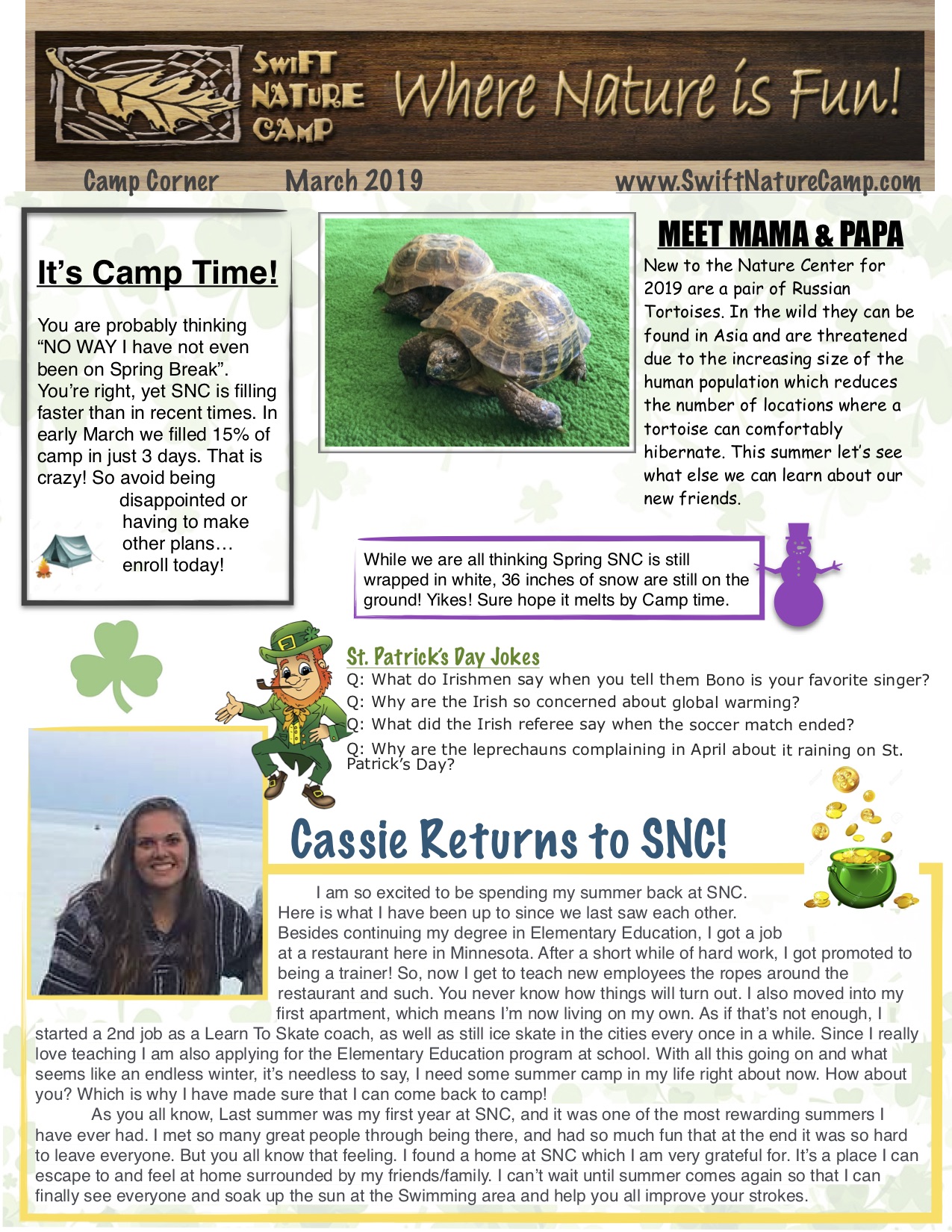
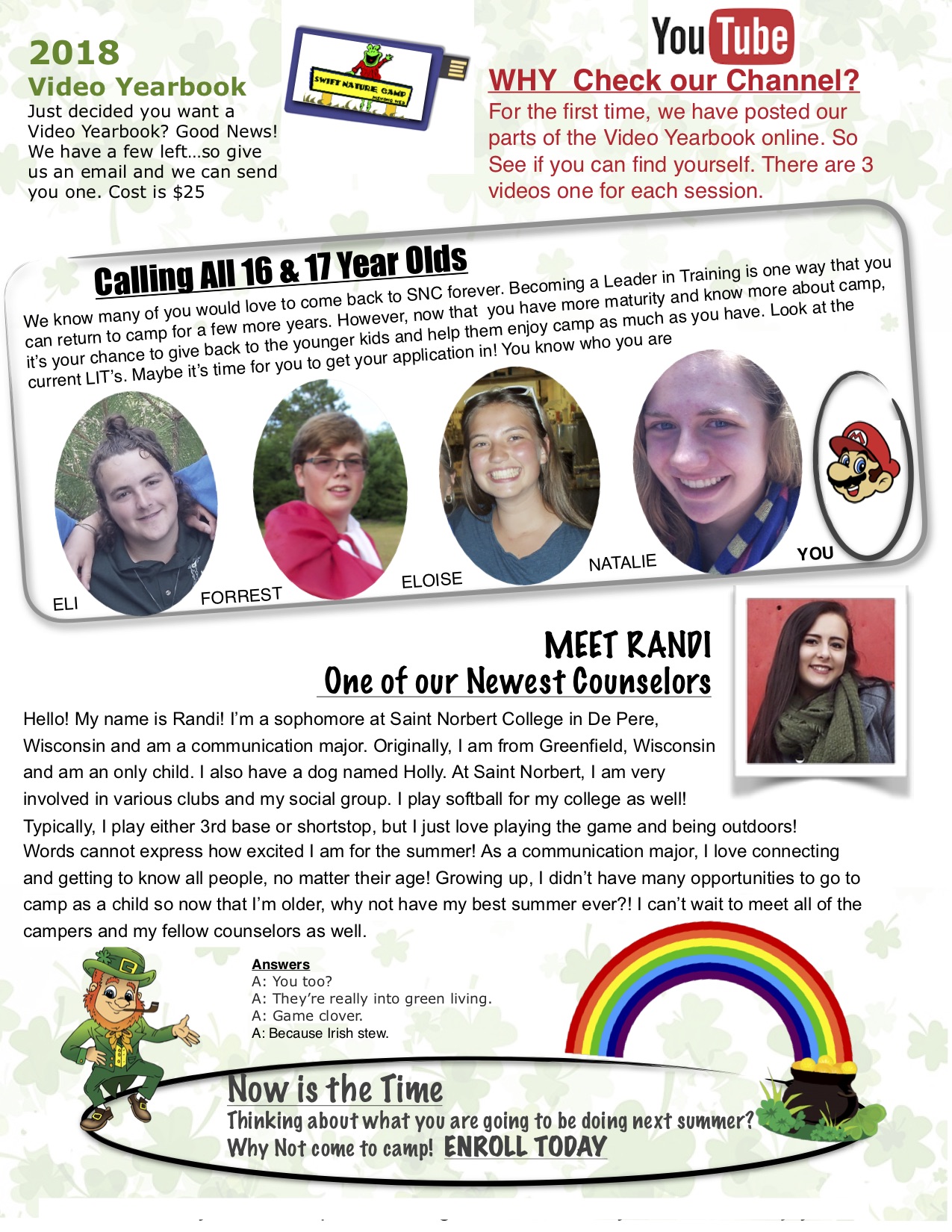
What did you learn from Nature?
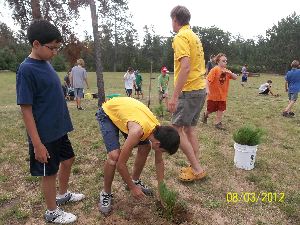
Historically, children played. Not todays play that is filled with devices, messaging & screen time or the Mom sets up a play date, no play was different. Today we call this Free Play, the ability for children to go outside, explore, make decision, get hurt, and most importantly learn about relationships by just figuring how it works. Louv believes This lack of Outdoor Free Play in todays world has “the increasing divide between the young and the natural world, as well as the environmental, social, psychological, and spiritual implications of that change.” In his books and papers, he mentions the mounds of data that implies that without a connection to nature a secure children will never develop. He believes that as parent we insure that our kids get good nutrition and required sleep, nature must be a part of raising a health child. So, as our lives become more busy and screens take up more of our time studies suggest that is the wrong direction and we need to be embracing nature. It is a necessity to being part of the human race.
Today, data is free and everywhere, so our children may know more about the destruction of rain forests, the extinction of 24 species per day or the melting polar caps. Yet, they have much less contact and awareness of their backyard natural habitat. So what this means todays kids are far less connected to “their woods” and are less connected to the people and their location in the world. No longer do children or adults make quiet time they always have a screen on. Today it is rare to step outside and explored the woods in solitude or lay in fields listening to the wind and marveled at clouds overhead. We have moved our relationship from nature to a screen and this does not give any of us a feeling of peace or tranquilly.
Love believes that when parents make a choice to get their children outside society benefit. Summer camps in particular Nature Summer Camps, are just one of the ways that parents can help make lasting memories along with connections to natural surroundings. With easy access to the great outdoors and opportunities to develop self-reliance within a nurturing community, today’s campers will remember fun-filled childhoods unplugged from urban life—and share their unique memories with future generations.
Nature not your bag? No problem you just need to know that getting your kids out side is important. So Before screen time let them go outside for 15 minutes. Let them figure out what to do…it’s ok if they get dirty. Follow those experiences up with an Nature Kids Camp like Swift Nature Camp where children can live out in nature hear the loons, see amazing sunsets or even get muddy when it rain. Let your children learn from the Natural World.
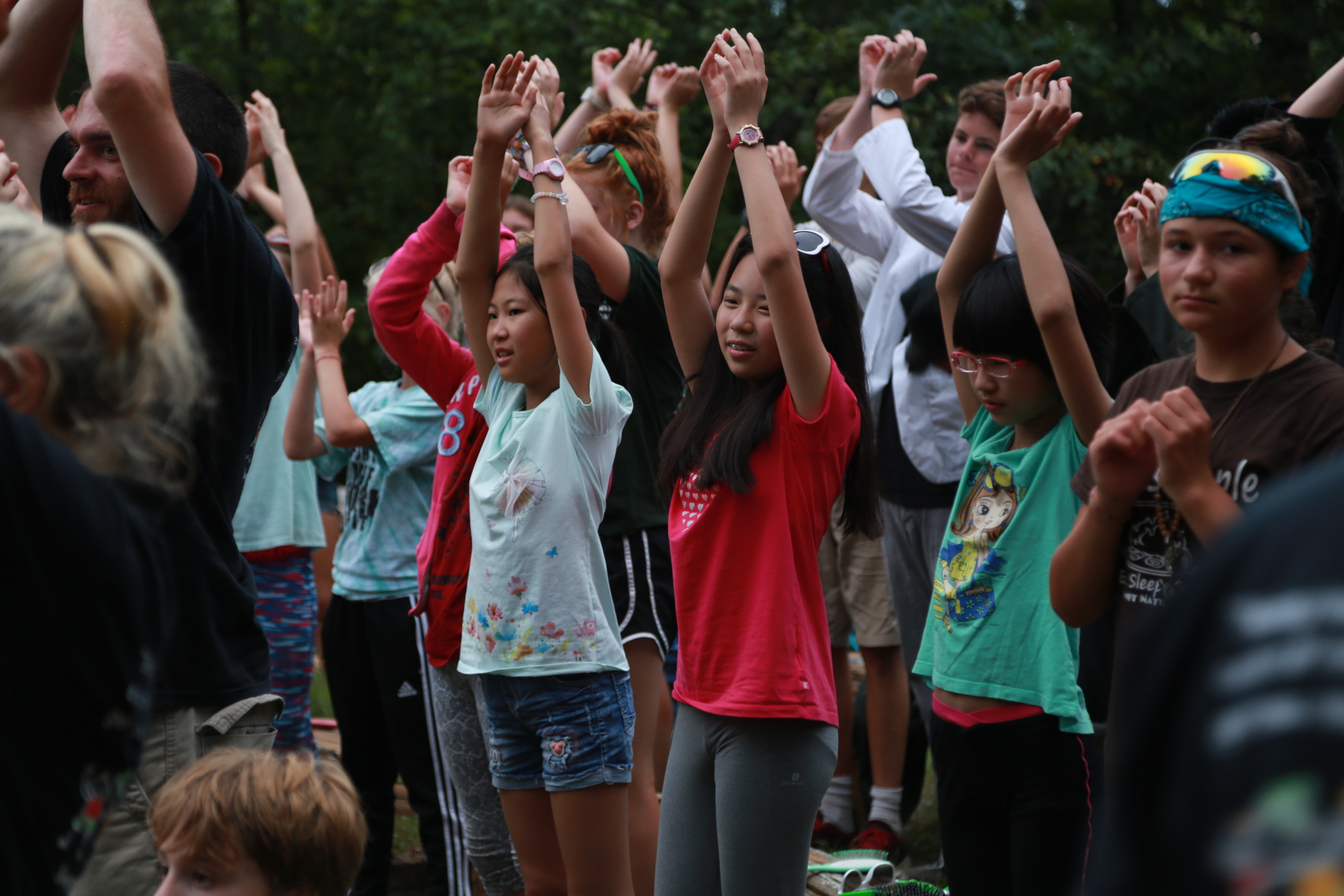
Most important to consider
So now you think you are ready to come to a USA summer camp. That’s great but is your child ready? This is just as important question. There are 2 areas to consider. First, are they mature enough to be away from you in another country? Obviously, camp is prepared to help children with all the things that they need to be doing, like teeth brushing, cleaning up, changing clothes etc. So what I am talking about here, is really whether they are excited to go to camp and participate. Will they miss you and being back home more than they are excited to be at camp? If so, this might not be the year to go to a summer camp in America. Second and even more important, does your child have a good grasp of the English language? This is very important. Camp is a social network, most of campers’ time is face to face communications. If a child cannot make friends at camp, they will feel left out and will remove themself from interactions. So, it is very important that your child can carry on basic communications and understand the basic language.
How to pick a camp
Not all camps are the same. Picking the right camp is very important. First, is to match your child’s likes with that of the camp. For instance, some children may look forward to going on camping trips and so they would want to find an Adventure Camp that takes frequent canoe, hiking and biking trips. Other children may love swimming and want to find a camp that has a lake and does a lot of swimming. The reason this is important is, because your child will no longer have a phone and so they will be active doing rather than watching. Doing things that they enjoy helps in this transition.. So now that you have this in your mind, a few other questions might be: time away from home? Where in the USA do you want your overnight summer camp to be? Coed or single gender? Religious or not? To learn more about picking a summer camp visit SummerCampAdvice.com
Where & When to Look?
Now is the time. Overnight Summer Camps in America do fill up fast. Some parents start looking as early as October for the following year. So it is important to start looking as soon as you have come up with a list that is important for your child. Next hit the internet. Every camp has a website and they are all filled with marketing information. Remember, they are trying to sell camp, so just be aware. Once you have found what you believe is a good camp then call or email the director and start asking your questions. I believe that Privately owned summer camps like Swift Nature Camp will give you more personal attention and will help you better customize your child’s experience. If you need more help please contact us Lonnie & Jeff at This email address is being protected from spambots. You need JavaScript enabled to view it.
Lonnie & Jeff Lorenz
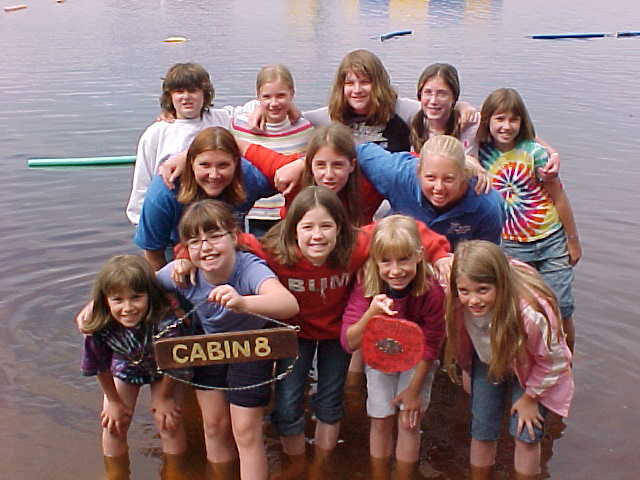
Jako dyrektor Swift Nature Camp, mam z super bohaterami do czynienia na codzień. Nasi obozowicze to super bohaterowie, którzy zachwycają nas każdego dnia.
Nasi obozowicze próbują nowych rzeczy, rozwiązują problemy, naprawiają to, co się zepsuło i rozsiewają radość dookoła. Zdaję sobie sprawę że to wszystko brzmi jak frazes, więc pozwólcie mi podzielić się kilkoma przemyśleniami.
Każdy super bohater wie, że „ wielka moc pociąga za sobą wielką odpowiedzialność” i nasi obozowicze uczą się codziennie by być odpowiedzialnymi w małych i wielkich sprawach.
Dzieci uczą się jak zrobić sobie pranie, jak poskładać ubrania, jak zaścielić łóżko czy posprzątać stół po posiłku.
Dla niektórych to być może błahostki, ale kiedy zagoniony rodzic próbuje położyć młodsze dziecko do spania, przygotować posiłki na następny dzień, odśnieżyć schody do domu i wszystko to w tym samym czasie, córka czy syn, którzy posprzątają po kolacji albo włączą pranie są naszymi domowymi super bohaterami.
Super bohaterowie nie poddają się łatwo. Kiedy przyjdą trudności, szukają innych sposobów by rozwiązać problem.
To jedna z moich ulubionych cech super bohatera jaką widzę w naszych obozowiczach. Kiedy dziecko po raz pierwszy strzela z łuku i nie trafi w tarczę, nie rezygnuje ale probuje dotąd aż osiągnie sukces. Albo gdy na spływie canoe utknie pod niewidocznym pod wodą głazem, obozowicze wiedzą co w takim przypadku robić i spokojnie odblokowują utknięte canoe. I jeśli sytuacja się powtórzy, to radzą sobie i wspólnie z opiekunami po całodniowym wysiłku docierają na biwak, gdzie wszyscy razem biesiadują przy ognisku wspominając przygody minionego dnia.
Super bohaterowie są troskliwi i opiekuńczy - ważne dla nich jest dobro innych. Obozowicze pomagają sobie wzajemnie, pocieszają, gdy ktoś tęskni za domem, albo coś się nie uda za pierwszym razem. Starsi uczestniczy obozu pomagają młodszym i uczą ich gier, których nauczyli się gdy sami byli młodsi.
Nasz Nature Center to miejsce, gdzie obozowicze opiekują się zwierzakami, karmią je, poją, czyszczą klatki i oczywiście poświęcają im wiele uwagi, bawiąc się i okazując im wiele czułości. Nasi obozowicze to super bohaterowie, którzy nie tylko dbają o innych ale rownież o przyrodę która ich otacza.
Kolejną cechą super bohatera jest odwaga. Nasi obozowicze są imponująco odważni. Dla niektórych wyjazd z domu do miejsca gdzie nigdy wcześniej nie byli, do ludzi, których nie znają to znak wielkiej odwagi. Widzimy odwagę podczas zajęć, w których dzieci uczestniczą na codzień. Skok do jeziora wymaga nie byle jakiej odwagi, jeśli dotąd pływało się tylko w basenie, czy praca nad nowym projektem w arts and crafts, zwłaszcza gdy nie jesteśmy pewni końcowego efektu.
Obozowicze są odważni gdy tylko z mapą a bez GPS czy telefonu wędrują po nieznajomych szlakach.
Super bohaterowie maja w sobie coś, co sprawia że są super. Niektórzy super bohaterowie
mają ponad ludzkie zdolności, a niektórzy zaś są super w sprawach takich bardziej normalnych.
I to właśnie jest typ naszych obozowych super bohaterów. Każde dziecko ma coś w sobie co czyni
je super bohaterem. A co jest super w twoim dziecku?




